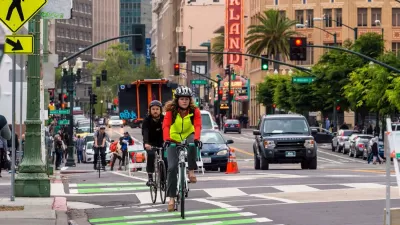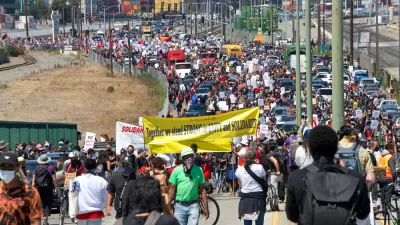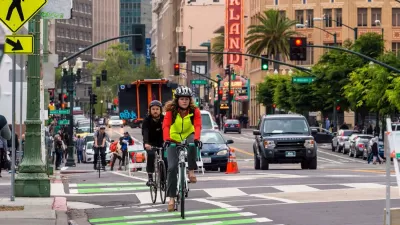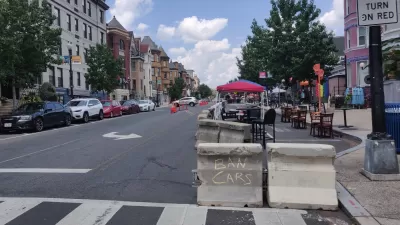Suddenly, cars aren't the first priority on 10 percent of the roadway in Oakland, California.

[Headline and story updated on April 13, 2020 to better describe the "Oakland Slow Streets" program.]
"Cars will soon be banned from 74 miles of Oakland's residential streets during the coronavirus-inpsired [sic] shelter-in-place, a move bicycle advocates wish would happen in other cities," report Allie Rasmus and Lisa Fernandez.
"The emergency measure, called 'Oakland Slow Streets,' will banish motorized vehicles from 10% of the roadway space in Oakland," according to the article.
Update: cars will not be entirely banished from the streets. Rather, cars will be required to travel at no faster than 10 mph while giving priority to pedestrians and people on bikes, according ot additional information reported by Roger Rudick.
The Oakland Slow Streets program moves Oakland far into the lead of the national trend of cities blocking cars from streets to allow more space for pedestrians and people on bikes. Minneapolis previously opened 18 miles of streets.
Rachel Swan provides additional coverage of the Oakland Slow Streets program in a paywalled article for the San Francisco Chronicle.
FULL STORY: Oakland to close 74 miles of streets to cars, paving way for pedestrians and bicyclists

Planetizen Federal Action Tracker
A weekly monitor of how Trump’s orders and actions are impacting planners and planning in America.

Maui's Vacation Rental Debate Turns Ugly
Verbal attacks, misinformation campaigns and fistfights plague a high-stakes debate to convert thousands of vacation rentals into long-term housing.

Restaurant Patios Were a Pandemic Win — Why Were They so Hard to Keep?
Social distancing requirements and changes in travel patterns prompted cities to pilot new uses for street and sidewalk space. Then it got complicated.

In California Battle of Housing vs. Environment, Housing Just Won
A new state law significantly limits the power of CEQA, an environmental review law that served as a powerful tool for blocking new development.

Boulder Eliminates Parking Minimums Citywide
Officials estimate the cost of building a single underground parking space at up to $100,000.

Orange County, Florida Adopts Largest US “Sprawl Repair” Code
The ‘Orange Code’ seeks to rectify decades of sprawl-inducing, car-oriented development.
Urban Design for Planners 1: Software Tools
This six-course series explores essential urban design concepts using open source software and equips planners with the tools they need to participate fully in the urban design process.
Planning for Universal Design
Learn the tools for implementing Universal Design in planning regulations.
Heyer Gruel & Associates PA
JM Goldson LLC
Custer County Colorado
City of Camden Redevelopment Agency
City of Astoria
Transportation Research & Education Center (TREC) at Portland State University
Jefferson Parish Government
Camden Redevelopment Agency
City of Claremont





























